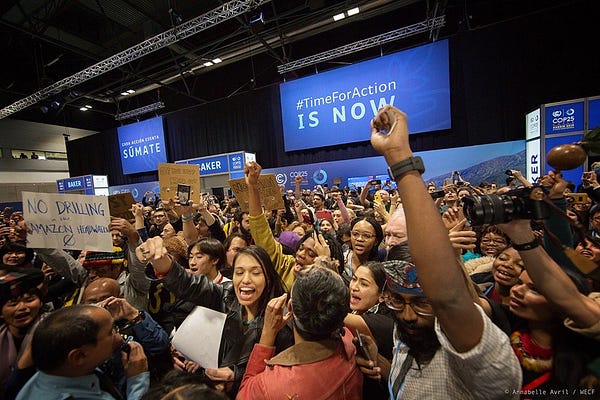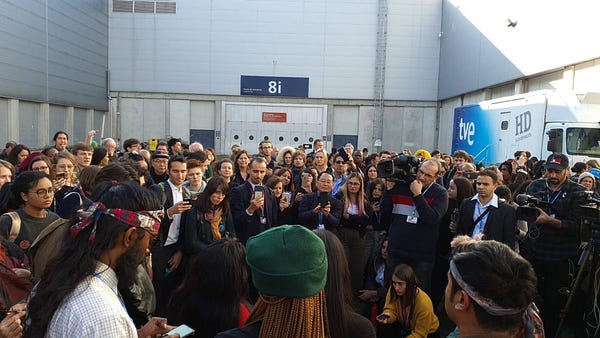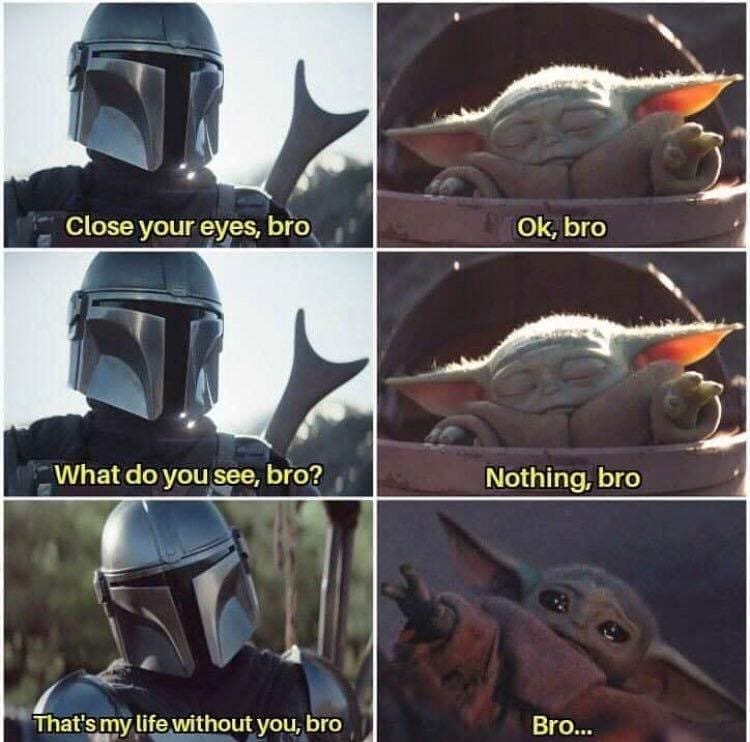
Tiger in a Tropical Storm, Henri Rousseau, 1891
So last week I was talking about how climate change is this collective problem with collective solutions and how we have to make personal changes while also pushing for systemic changes. But there are a lot of other ways to look at this problem, and one important one is how climate change is an act of violence—human-caused suffering perpetuated disproportionately against the people who have done the least to deserve it.
I was thinking about this reality a lot this week, including while listening to an interview with marine biologist Dr. Ayana Elizabeth Johnson, who described breaking down into tears while reading a recent UN report on climate change and oceans.
When we think about who has caused climate change, it is corporate greed and government malfeasance, and the creation of this insane fossil fuel based economy, when we have other options. This is a knowing decision. We’re getting screwed and the people who are getting screwed the worst are the ones that emitted the least carbon… It’s just totally unfair and it’s just so cruel.
And at the same time, when we think about Hurricane Dorian hitting the Bahamas and decimating that island and then a boat of a few dozen people trying to come to the US to find a safe place to live and we turn them away. Those are the things that I think about when I read the science. Because it’s not just numbers, it’s whether people live or die.
And we turn them away is the real gut punch there. Like when Kate Marvel says, “the scariest thing about climate change is what it will make us do to each other.”
Then there was the news from COP25, in which members of civil society, many indigenous and people from the Global South, were literally shoved outside of the negotiation space after a nonviolent action. Hundreds of representatives, called observers, had their access to negotiations temporarily revoked. This chilling image of the giant industrial door and a row of stoic men in suits barring reentry felt like some kind of harbinger.
Turns out I knew some people who were at this disturbing scene, staff from the nonprofit Corporate Accountability, who stood with protestors outside in solidarity. So I got on the phone with Sriram Madhusoodanan, deputy campaigns director, in Madrid to talk about what’s happening there. Disclosure here, my wife (Borat voice) Jamie worked for Corporate Accountability for a long time so I’ve known Sriram and many of his colleagues for years. I really appreciate him taking the time out of his very busy schedule to talk to me for my dumb newsletter where I make Borat jokes and talk about dogshit and comic books and also climate change.
Before I get to the interview, a little about COP25. The negotiations that happened over the past two weeks were focused on the rulebook for implementing the Paris Agreement, the voluntary framework nations agreed to as a means of reducing global emissions. In case you wondered how that implementation is going, it’s not great! And as I write this it sounds like negotiations are stalling, and the US (in the process of withdrawing but still hanging around to screw it up) and other richer countries are being blamed.

Sriram explained some of the points of contention, which also reflect the demands of climate protestors:
Disagreement over “loss and damage,” which is how poorer countries are compensated for harm caused by climate change (see above). The US, the largest historical emitter of GHGs, has been trying to escape its liability because we are garbage.
Article 6, on the creation of international carbon markets, where countries can buy and sell emissions reduction credits to meet their climate goals. Many, including NGOs like Corporate Accountability, oppose such schemes on the basis that there’s tons of fraud, it’s questionable whether they reduce overall emissions, they create bad incentives, and threaten indigenous peoples.
And, of course, progress is moving way, way too slow.
One other note—corporations are all over these negotiations, and Greenpeace’s Jennifer Morgan told Vox that polluters have been shaping the agenda. “This COP [meeting] is particularly disturbing because I see more and more the emphasis or the influence of the fossil fuel companies here than should be the case,” she said.
Now here’s my chat with Sriram Madhusoodanan (edited for length and clarity).
Maybe you can start off and just tell me what happened in the lead up to the activists being kicked out? There was an action, right?
Yeah, so there was a nonviolent action that activists were organizing outside one of the plenary halls on Wednesday, which was right before the UN secretary general was scheduled to speak. People came together to demand the kind of progress that's being called for out in the streets, versus the really slow pace of progress and lack of ambition that we're seeing in these halls. And the fact that often it feels like these governments aren't really listening to nor being really held accountable to people.
A number of people led predominantly by indigenous folks, women, non-binary folks, folks from the Global South, activists, occupied the space and unfurled a banner calling for rich countries to step up and pay up, acknowledging the fact that it's the US, European Union, and other historical polluters that have been blocking key elements of these negotiations, especially climate finance and loss and damage.





As soon as they did that, they were met by a pretty strong response and aggressive reaction from the UN security forces, that ultimately led to much of the coverage that you saw. Activists were bullied, pushed, kicked out of the space of the plenary and pushed out into the cold.
In addition to that, there was this really kind of, I don't know, it was a remarkable moment and maybe tells us more about how these conferences have been going than anything else, where the door was being brought down with the activists outside and an entire line of security guards basically blocking them from reentering.



Yeah. You know, and that image was so powerful. So were you in that group of people then, you and Corporate Accountability were involved in that group of people who did the protest?
Yeah, a few of us were involved and were outside, really in partnership and solidarity with many of our allies from the Global South and indigenous people and youth who had decided, you know, enough is enough. We've seen this UNFCCC be around for 25 years, and because of governments who've been actively blocking progress in these talks, really failed to achieve the kinds of impact that it needs to.
“Why is the UN seeing us as the threat here? When the real threat to people and the planet is the fossil fuel industry and other big polluters that are still walking these halls.”
And I think it's also important to note that while activists were censored, were kicked out, and had a very aggressive response from security, fossil fuel corporations and other big polluters are essentially having a red carpet rolled out for them with sponsorships and with their trade associations walking the halls and influencing the talks. While activists fight to even have a small amount of space to bring forward their concerns from the frontlines of the climate crisis, and in some cases are even censored or extremely limited in how they can voice these concerns to the governments that are there negotiating a treaty or rules implementing one that are going to affect them and their lives every day.
Maybe you could tell me what it was like? What was the response of the activists? What were your feelings at the time?
Immediately, activists started chanting "shame on you, shame on you." I think it was striking that that was the response that the UN decided to take. I think it's unprecedented in the 25 years that it has moved 320 people out and de-badged them for the day for taking an action like this.
I think it also speaks to a deeper sensitivity that we have to raise, which is why is the UNFCCC so afraid of hearing these direct stories from activists and civil society on the frontlines of this crisis. When, if anyone looks around, they will tell you and certainly millions of people on the streets are saying that what this process has thus far delivered is far short of the ambition that's necessary. And you know, I would also argue that's not by mistake. You've got very powerful interests in countries that are blocking progress every step of the way, still to this day as negotiations are wrapping up.
Right.
Can I answer that another way too? I mean, I think it was also one of bewilderment too because you know, many activists were there, many of them with their belongings or their coats and things like that still inside. And you know, just thinking wait, why is the UN, why are they seeing us as the threat here, when the real threat to people and the planet is the fossil fuel industry and other big polluters that are still walking these halls.
And then, you say de-badge. Can you describe to me what that means exactly?
Yeah. So the UNFCCC works off of a process of observer accreditation. So you know, one needs to be an accredited observer in order to basically have a badge to attend the talks. And then the UNFCCC has a number of guidelines through which they will be able to say, well, if you're in violation of these, that then means that we have the power or authority to take your badge away.
I will say that the general experience from civil society is that these rules are applied rather arbitrarily. So over the course of the past COP, you know, there've been instances where a newsletter from the Climate Action Network called Eco, which has been a staple of many of these talks and is a joint effort of civil society around the world, was not allowed to be distributed first inside the COP on the claim that it was “a paperless COP,” even though there was lots of paper that was being handed out by businesses and trade associations. And then second, Spanish police stopped them from handing it out outside. So, you know, this is how the UNFCCC often has been using these guidelines, to actually silence expression and concerns from civil society.
So have the protestors been allowed back into the negotiations?
As of Thursday all of the protesters, except for three, were allowed back into the premises. And it seems like these remaining three won't be allowed back in for the duration of the COP.
Who are those three? Why are they not being let back in?
Good question. You'd have to ask the UNFCCC. At least two of them were folks who were actively organizing and leading the chants and organizing people during the action. And one of them was holding a banner.
Have there been protests like that previously?
There's absolutely been protests. In fact, in Warsaw, as one example, there was a massive walkout from civil society, not in small part protesting the fact that the COP president was speaking at a trade association summit of the World Coal Association that was happening simultaneously and next door to COP19 in Warsaw.
“You know, you walk through these halls and you just wonder, are the people here seeing the same things that we're seeing out in the streets and in the real world?”
I think that what was unique about this one is perhaps the political moment we're in right now. I mean we're looking back at what's been a lost decade of climate action. Since 2009, there's been really little to no meaningful progress on the key indicators that we need to address and the root causes, which is reducing fossil fuel emissions. So I think that there's a rightful frustration and there's an anger.
Would you say that these negotiations are worse or more frustrating perhaps than previous negotiations? Or do you think it's more that people are just sort of fed up with more of the same?
They're more frustrating because of—how do I say this? You know, you walk through these halls and you just wonder, are the people here seeing the same things that we're seeing out in the streets and in the real world, because it does feel like the pace of progress is so slow and so glacial and it is not meeting the ambition of what people are demanding.
I think in this COP we saw a number of young people who had been part of the Fridays for Future movement, many of whom, this was their first COP. And rightfully so, they came out of it frustrated at the pace of progress, but also livid at, at least this was my perception of it, livid at the amount of presence of the fossil fuel industry and other corporations inside the space. It's kind of what you get when you have a climate conference that is bankrolled by Spain's largest polluter, like Endesa.
I think a lot of people have a kind of ambivalence about the Paris Agreement. Maybe they are hopeful for it, but disappointed by it. What do you think activists and maybe yourself personally are feeling about the fate of the Paris Agreement at this point?
Yeah. You know, and let's be clear, the Paris Agreement was certainly not perfect to begin with and fell far short on a number of key elements. But in this moment it is really the global mechanism that we have to address the climate crisis in a way that could deliver on climate justice demands, particularly for those in the Global South that are being most impacted by the climate crisis right now.
Again, none of these things are in and of themselves good or bad, but it does come down to the governments in the room and how they choose to move forward. And time and time again, even to this day, we see the United States actually lighting the house on fire on its way out the door. And we see other countries that try and position themselves as climate champions, the EU prime among them, but also Australia and Canada, really enabling or even cowering behind the US every step of the way.
So, I think that the Paris Agreement itself, whether or not it succeeds very much depends on what governments in the room continue to do. Under Trump, you could say, yes the US is always going to be obstructionist and has been for a very long time, but the EU, Australia, and Canada can choose to stop enabling them.
“Time and time again, we see the United States lighting the house on fire on its way out the door.”
And developing countries can also choose to unite behind real solutions and ensure that those are being advanced rather than the kind of distractions that we're seeing here. And we actually see that when these countries from the Global South present a united front—and truly they do represent the vast majority of the world and certainly the largest section of people impacted right now by climate change—they are unstoppable.
Well that covers everything I wanted to ask you. I really appreciate you taking the time to talk to me.
Yeah, definitely. And hopefully I'll see you sometime in Boston.
Yeah, for sure. I guess is there anything you'd want to add before I let you go?
Yeah, you know, I think just one of the things, to step back a moment, for big picture stuff. I think big polluters are effectively planning to torch the planet and they've infiltrated talks like the UNFCCC to advance exactly this agenda. It's fundamentally to protect their profits and continue business as usual. And we see plans of theirs, including expanded use of fossil fuels, that would lock us into soaring emissions.
So what, as a global community, we were saying inside those talks and what millions of people out in the streets are demanding outside and will continue to demand, is that we need to kick these polluters out. We need to make them pay and we need to advance real solutions to address the climate crisis.
Links
Gov. Charlie Baker is often praised for his business-like approach to the T, cracking the whip and getting its budget under control. As it turns out, cutting spending and accelerating projects has compromised its safety.
I wrote previously about the city’s initiative to add housing to public facilities, that includes adding apartments to four library branches.
When liberal writers hate the left.
How Taylor Lorenz uses the internet, including TikTok: “What you do is essentially sit and watch an endless stream of entertaining videos until you get tired.” That is accurate.
More cities are kicking out cars (and they feel fine).
Public utilities, including Arizona’s largest APS, donated millions in charitable giving (on top of political spending) to gain political influence.
If you buy this bar in Ingomar, Montana you will also become the town’s 14th resident.

Podcasts
I’ve only listened to the introductory episode, but I’m very excited about Hot Take, a new podcast from Amy Westervelt and Mary Annaïse Heglar about “Media criticism—but intersectional, constructive, and climate” which is extremely Crisis Palace.
I also listened to an older episode of the podcast No Place Like Home, another great climate podcast (I should do a climate podcast issue) with Heglar. She talks about what the climate movement could learn from the civil rights movement, and how emerging activism is much more urgent and intersectional, and shakes off the sterility and isolation of traditional (cough white) environmentalism. I like her ideas on how we need to do a better root cause analysis of climate change, and her method of “asking why five times” which after just a couple of whys climate leads you to slavery and then colonialism.
Spend Money
Trying out this new section lmk. We had an early gift exchange with Jamie’s family over the weekend and got a lot of very thoughtful gifts, you know the kind that really make you feel seen. But I think my favorite is this Octavia Butler shirt—designed by Nick James, sold by Philadelphia Printworks—from my brother in law and sister in law (what a gross term that is).

“There is nothing new under the sun, but there are new suns.”
The company supports “local and national organizations doing work in the areas of food security, police brutality, immigrant rights, tlgbq+ rights, mass incarceration, and more.” So go spend some money there they have lots of awesome designs.
Watching
I was super into Orphan Black for a while there, and then the third season got a little messy but now I have picked it back up and just finished season 4. It’s definitely one of the best sci-fi shows in recent memory, and a different kind of sci-fi than you usually see on TV for sure. It’s also just super weird and bounces all over genre and a huge ensemble of supporting characters a little like Sense8 did at its best. But, if for no other reason to watch, Tatiana Maslany is staggeringly good playing like 10 different characters. I often find myself forgetting it’s her doing some of them.

Reader, this is how I feel about you when I skip a week of this newsletter.
Who knew a show I have never watched and its characters I do not understand would become such an important part of how I communicate on a daily basis.
Jamie sent me the above meme and it has a personal resonance because one time we were at this craft brewery (shocker) and there was a birthday party with some young people of a certain aesthetic let’s just say and the birthday boy arrived and addressed the crowd and from a distance I imagined him saying “My bros. I want you to know that you truly are my bros.”
And you know what. YOU are truly my bros and I mean that in a colloquially gender neutral way. I will always be there for your Sunday afternoon birthday party at a craft brewery, virtually speaking, of course.
Tate
PS. This was a longer one but I’m glad you stuck around. And always feel free to let me know if you liked this feature or that feature if you’d want to see more of something etc bro.




